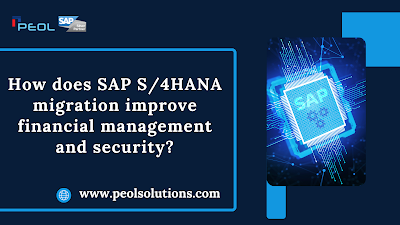How does SAP S/4HANA migration improve financial management and security?
Introduction:
SAP S/4HANA migration is one of the most transformative steps an organization can take to enhance financial management and improve security across their enterprise systems. In today’s fast-paced business environment, staying ahead of technological advancements is critical, and the migration to SAP S/4HANA offers businesses a way to streamline operations, enhance efficiency, and bolster security. In this article, we will explore how SAP S/4HANA migration can revolutionize your financial management processes while significantly strengthening your security posture.
SAP S/4HANA:
SAP S/4HANA is the next-generation enterprise resource planning (ERP) suite designed to empower businesses with real-time insights, smarter decision-making, and improved operational efficiency. One of the core advantages of migrating to SAP S/4HANA is its robust financial management capabilities. By offering comprehensive tools for accounting, financial planning, and analysis, it allows businesses to streamline their financial processes while ensuring better visibility and control over financial data.
Real-Time Financial Reporting and Analytics:
Traditionally, financial management systems often involve complex reporting structures, leading to delayed insights and decision-making. With SAP S/4HANA’s in-memory computing technology, financial data is processed in real time. This allows businesses to access up-to-the-minute reports and analytics, helping decision-makers to evaluate financial performance with greater accuracy and speed. This not only accelerates financial closing and reporting cycles but also enables companies to forecast more effectively and make strategic decisions based on accurate financial data.
Improved Financial Planning and Forecasting:
SAP S/4HANA helps businesses adopt a more proactive approach to financial planning. The software uses advanced machine learning algorithms and predictive analytics to generate accurate financial forecasts and simulate future scenarios. This helps businesses optimize their budgeting and planning processes, ensuring that financial resources are allocated more efficiently, and risks are minimized. Whether it’s assessing cash flow, revenue, or cost projections, the migration to SAP S/4HANA enables a dynamic approach to financial forecasting.
Centralized Financial Data Management:
Migrating to SAP S/4HANA consolidates financial data management into a single, unified platform. Gone are the days of fragmented systems and disconnected data silos. The new architecture ensures that all financial information, from general ledger entries to accounts payable and receivable, is managed centrally. This reduces redundancies and the possibility of errors, creating a cleaner and more efficient process. Furthermore, the data is presented in a way that’s easy to interpret, making it easier for finance teams to analyze and act on the information.
Enhancing Security Through SAP S/4HANA Migration:
Security is one of the most pressing concerns for any business handling sensitive financial data. As organizations migrate to cloud-based systems, the need for stronger security measures has never been more crucial. SAP S/4HANA’s migration process includes a comprehensive security framework designed to safeguard financial data and ensure regulatory compliance.
End-to-End Encryption and Data Protection:
One of the key features of SAP S/4HANA migration is its strong focus on data encryption. Sensitive financial data is encrypted both in transit and at rest, ensuring that it is protected from unauthorized access at all stages. This level of security is especially important when financial data is being shared across different systems or locations. In addition to encryption, SAP S/4HANA incorporates secure authentication protocols, ensuring that only authorized users can access the system.
Enhanced Compliance and Regulatory Adherence:
In today’s world, businesses are under constant scrutiny when it comes to financial compliance. SAP S/4HANA provides a platform that is designed to meet regulatory requirements such as IFRS, GAAP, and others, making it easier for businesses to remain compliant. The system’s automated compliance monitoring features track changes in regulations and provide alerts when updates are necessary. This helps reduce the risk of non-compliance and the associated penalties.
Role-Based Access and Security Controls:
The migration to SAP S/4HANA also provides enhanced role-based access controls. Each user within the system is granted permissions based on their specific role within the organization. This fine-grained approach to access management ensures that financial data is only accessible to those who require it for their job functions. For example, senior finance personnel might have access to sensitive financial reporting, while junior staff may only have access to transaction data. By limiting access to sensitive information, businesses reduce the risk of insider threats and unauthorized data manipulation.
Cloud Security for Financial Data:
For businesses migrating to the cloud, SAP S/4HANA offers an additional layer of security by leveraging the cloud’s robust infrastructure. Cloud security services include regular vulnerability assessments, automatic security patching, and disaster recovery planning. By moving to the cloud with SAP S/4HANA, businesses benefit from the expertise of cloud service providers who specialize in securing financial systems, reducing the burden on in-house IT departments.
Benefits Beyond Financial Management and Security:
While SAP S/4HANA migration brings significant improvements to financial management and security, it also offers broader benefits that impact the overall efficiency of the organization. The integration of financial data with other business operations, such as procurement, sales, and production, creates a more cohesive and transparent enterprise ecosystem. This integrated approach enhances cross-departmental collaboration and helps identify opportunities for cost-saving, process automation, and operational optimization. Additionally, the migration allows businesses to scale more easily. As the company grows and its financial needs become more complex, SAP S/4HANA can accommodate the increase in data volume and transaction complexity without sacrificing performance.
Conclusion:
Migrating to SAP S/4HANA is not just about adopting a new software solution; it’s about transforming how businesses manage their financial operations and protect their most sensitive data. With real-time insights, advanced analytics, and centralized financial data management, SAP S/4HANA empowers businesses to make better, faster financial decisions. Coupled with enhanced security features, such as end-to-end encryption and role-based access controls, the platform ensures that financial data is secure and compliant with industry standards.
For More Details:
Address:#306, 2nd Floor, HRBR Layout, Poonam Chambers,3rd Block, Near Hennur Bus Depot,
Bengaluru, Karnataka 560043
Call: +91-8040905243
Mail: sales@peolsolutions.com
Visit: www.peolsolutions.com




Comments
Post a Comment